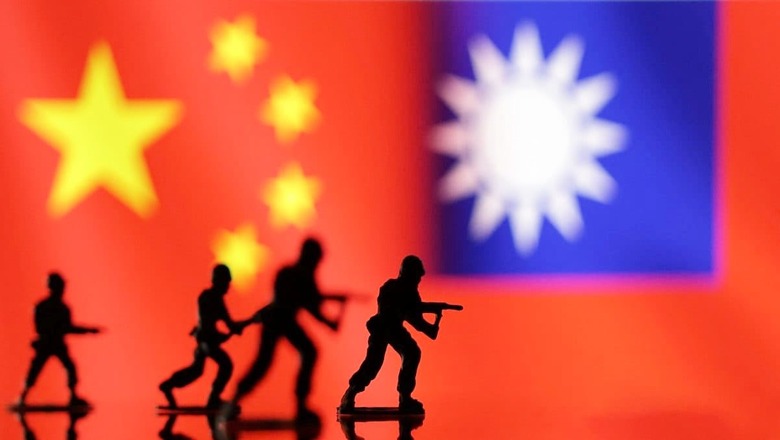
views
Taiwan, officially known as the Republic of China, recently had its presidential election, where the Democratic People’s Party (DPP) won for the third consecutive term, a first in the island nation’s history. DPP’s victory is perceived as an act of defiance and a setback to China’s occupational plan towards Taiwan. Post these elections, the world has witnessed an increasingly aggressive stance from China, aspiring for total domination in the South China Sea, starting from Taiwan, the first “island chain”.
The contentious China-Taiwan relationship is deeply rooted in the island nation’s history and has witnessed a tense situation brewing for the last several years. Separated from China by the Taiwan Strait, Taiwan came to be known as the Republic of China after China’s nationalist government under Chiang Kai-shek lost to the Mao Zedong-led Communist group in 1949, who then fled to Taiwan. The island nation, however, was under martial law from 1949-87 under Kai-shek’s Kuomintang Party (KMT) and only in 1992 did Taiwan witness its first democratically elected presidential election.
The People’s Republic of China, however, has maintained the position that Taiwan is an integral part of China and perceives it to be a renegade province. The long-term goal of “peaceful reunification of Taiwan” has been the CCP’s goal since the 1970s, however, this gained more prominence under Xi Jinping’s leadership. Xi’s renewed call for a reunification process is evident from his “One Country, Two Systems” model announced in 2019. This model, however, has been vehemently rejected by the majority Taiwanese population.
A look into the political culture in Taiwan reveals that there are two factions viz, the Kuomintang Party (KMT) which largely maintains a pro-China position and endorses China’s 1992 consensus, and the DPP, which opposes Communist China completely.
DPP, which has historically been associated with formal independence, maintains a ‘status quo’/ democratic position, falling short of declaring formal independence in terms of the island nation’s relations with China as opposed to the KMT. This has resulted in the DPP having a contentious relationship with mainland China. The relations took a sour turn after the 2016 presidential election in Taiwan when former president Tsai Ing-wen refused to increase cross-strait relations with Beijing and opted for trade diversification, following which Beijing severed all diplomatic ties with Taipei.
Lai Ching-te, the former Vice President and the new President-elect voiced his support for the ‘status quo’ position in terms of relations with China and wished to seek a reopened communication with Beijing. However, during the presidential election in Taiwan, the PRC branded Lai as a “separatist” and tried to manipulate these elections as a choice for Taiwanese people between war and China. Xi Jinping reiterated Taiwan’s reunification with China as “inevitable” weeks before the presidential election. Beijing’s attempts to create political divisions that would undermine popular support for DPP via disinformation campaigns and cyberattacks were rampant. This also indicated China’s aggressive interference in internal political matters of Taipei. However, China’s attempts, in the end, proved to be futile as reflected in the election mandate.
China’s reaction to DPP’s election victory, though seemingly restrained, indicated that the election results would have an impact on cross-strait relations as Xi would continue to pursue the ‘One China’ policy. However, post-election result, Beijing has stepped up its grey-zone warfare, employing non-kinetic tactics short of actual combat, in an attempt to intimidate Taipei. The increase in patrols of aircraft, warships, surveillance ships and aircraft over and around the strait has become a common occurrence of Chinese show of force to undermine Taiwan’s democracy.
The recent launch of balloon barrage, comprising spy balloons across Taiwan’s airspace by China and the daily operations of military vessels can be viewed as typical Chinese tactics to intimidate Taiwan. The intensified frequent patrols around Kinmen Islands, which has been traditionally controlled by Taiwan, following the death of two Chinese fishermen engaged in illegal operations in Taiwanese waters are instances of China’s grey-zone tactics against Taipei’s popular mandate. China blamed Taiwan for the deaths of the two Chinese fishermen though their speedboat had capsized near Kinmen waters after being chased by Taiwan’s Coast Guard. As per Taiwan’s defence report, these tactics by China are meant to intimidate Taiwan and coerce the public into submission to its stated policy.
It has been observed of late that Beijing has also been seen to conduct frequent military drills near Taiwan. This is seen as another reflection of China intensifying its military activities near the Taiwan Strait. Moreover, in the recent National People’s Congress meeting, the Chinese Communist Party (CCP) reiterated its strategy of resolving the Taiwan issue in the new era and mentioned that Beijing would be ‘firm’ in advancing the cause of Chinese reunification. Interestingly, in Premier Li Qiang’s report delivered in this meeting, reference to “peaceful” reunification was omitted, unlike the previous reports. This indicates China’s hardening stance towards the island nation. It also underlines the possibility that China may go beyond the peaceful process to attain its objective of ‘reunification’.
In line with China’s goal of full modernisation by 2035, the country’s defence budget has witnessed a continuous increase over the years. This year, the defence budget has increased by 7.2 per cent focusing on Taiwan, irrespective of its slow-growing economy. While China’s military modernisation is aimed at its reunification process, many believe that it is unlikely to transform into a full-fledged war anytime soon. For now, Beijing is asserting its domination on the Taiwan Strait through its grey-zone tactics, and it will likely continue to interfere with Taiwan’s democratic setup, now that the DPP continues to remain in power.
However, considering the popular mandate which is against reunification with China, Beijing’s attempts are likely to backfire and might consolidate DPP’s position further in Taiwan. This would also lead to more vocal resistance to China’s bullying tactics by the Taiwanese people.
The writer is an author and columnist and has written several books. His X handle is @ArunAnandLive. Views expressed in the above piece are personal and solely that of the author. They do not necessarily reflect News18’s views.




















Comments
0 comment